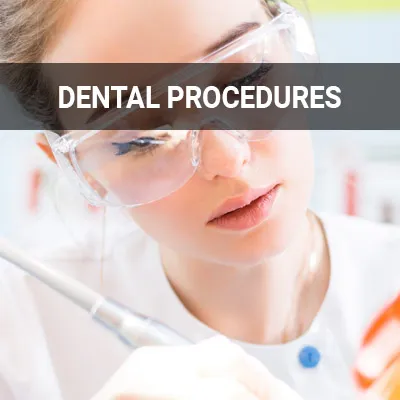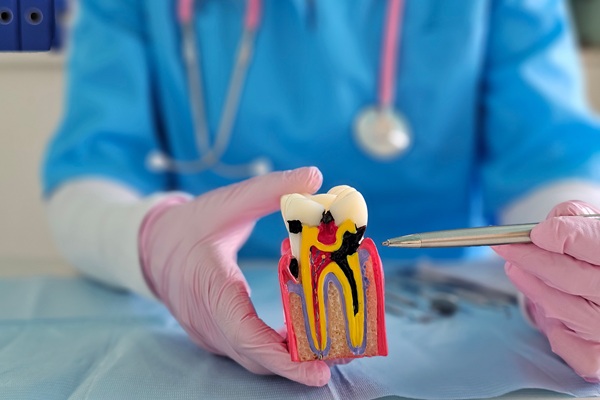Root Scaling and Planing Dumont, NJ
Patients with gum disease can benefit from root scaling and planing. This treatment is a key part of restoring healthy gums and teeth. Root scaling and planing treatments can combat the harmful effects of gum disease and keep your mouth healthy.
Root scaling and root planing treatments are available at Dumont Family Dental in Dumont and the surrounding area. Our team can help improve your oral health. Call us at (201) 374-7202 to learn more about our services or schedule an appointment.
An Overview of Root Scaling and Planing
Root scaling is a periodontal treatment that deep cleans the gums. This treatment is more extensive than the routine cleaning during a regular dental check-up. We will remove all plaque, bacterial toxins, and tartar deposits from the teeth and root surfaces during the procedure. A dental scaler or ultrasonic instrument can also assist in clearing the bacterial buildup.
For even deeper cleaning, patients can also have a root planing treatment. During root planing, we will clean under the gum line to remove plaque and tartar. The root surface of the gums is smoothed and treated to keep gum disease from progressing. These non-surgical procedures aim to remove bacteria from the gum and root with patients with deep periodontal pockets.
” These non-surgical procedures aim to remove bacteria from the gum and root with patients with deep periodontal pockets.”
Candidates for Root Scaling and Planing
If a patient has gum disease, the dental team will review their treatment options. Mild forms of gum disease may respond to a routine cleaning or over-the-counter products. However, if the patient has advanced gum disease, the team may suggest scaling and planing. Keep in mind that advanced gum disease may be a sign of an underlying health condition. Patients sometimes develop gum disorders due to chronic health problems or prescription medication. Long-term stress can also play a role. The dental team may refer the patient to a medical doctor or another provider for further evaluation.
Patients with complex dental concerns may also need specialized care. If the patient developed gum disease after a serious accident or injury, they might need additional treatment. If necessary, the team can provide a referral to an advanced provider.
“Mild forms of gum disease may respond to a routine cleaning or over-the-counter products.”
A Breakdown of the Procedure
Depending on the severity of the situation, root scaling and planing treatments may be broken up into multiple appointments. These procedures are done on an outpatient basis. Patients may or may not need a local anesthetic to numb the treatment site. We may focus on certain parts of the mouth during each appointment instead of treating the entire area in one visit.
Root scaling occurs before root planing. We will scrape plaque deposits from the teeth and in the large pockets between the gums during root scaling. During root planing, we will go deeper into the gum line to remove bacteria and plaque. We will smooth out the roots deep within the gum line, clearing off tartar build-up and bacteria. At the end of the procedure, the gums and mouth are flushed with water to remove any remaining loose residue or bacteria.
“Depending on the severity of the situation, root scaling and planing treatments may be broken up into multiple appointments.”
Check out what others are saying about our dental services on Yelp: Root Scaling and Planing in Dumont, NJ
Benefits and Drawbacks of Root Scaling and Planing
Root scaling and planing remove hidden pockets of infection below the gumline. This procedure also deep cleans to eliminate plaque and tartar. Most patients respond well to root scaling and planing. This procedure can treat even stubborn cases of gum disease. It may also prevent future dental concerns like decay or abscess.
However, like any dental procedure, root scaling and planing carry some risk. Occasionally, patients may experience oral bleeding or irritation. Patients may also have an allergic reaction to the materials or medications used during treatment. Rest assured that serious side effects are rare. Our dental team takes every precaution for our patient's safety.
Sometimes, a single root scaling and planing procedure may not resolve the underlying problem. Patients may need further treatments, including oral medication. Patients with chronic gum disease may also need repeated procedures. Our dental team can explain what to do if gum disease persists after root scaling and planing.
“Most patients respond well to root scaling and planing.”
Questions Answered on This Page
Q. What are root scaling and root planing?
Q. What happens during a typical root scaling and root planing procedure?
Q. Who are candidates for root scaling and planing?
Q. What are the benefits and drawbacks of root scaling?
Q. What aftercare should occur after treatment?
People Also Ask
Q. Is increased sensitivity to temperature a sign that endodontic surgery is necessary?
Q. Am I at high risk for developing oral cancer?
Q. What is the difference between endodontists and dentists?
Q. What is the difference between a dental cleaning and a deep cleaning?
Q. What are some common signs of receding gums?
Q. How can you save a tooth with a root canal?
Q. Are pain and tenderness when touching the teeth or chewing a sign of a problem?
Procedure Aftercare
After root scaling and planing, patients may experience:
- Gum bleeding
- Irritated gums
- Tooth sensitivity
- Soreness or aching
These side effects usually disappear within a few days. Patients can speed their recovery by following the team's aftercare instructions. During recovery, patients may need to avoid certain foods. Patients may also receive instructions about their at-home oral care. Thorough brushing and flossing help prevent gum disease from returning. However, patients may need to delay flossing a few days to allow the gums time to heal. The dental team can provide more information about when patients can resume their regular activities.
Many patients with periodontal disease need ongoing care. They may benefit from annual scaling and planing procedures. These procedures can overlap with the patient's regular exams and dental cleanings. Our team can help patients develop a plan for their future dental care.
“Many patients with periodontal disease need ongoing care.”
Frequently Asked Questions
Q. Is root scaling and planing painful?
A. Dental providers use numbing medication to prevent patients from feeling discomfort during treatment. Afterward, patients may experience sore or tender gums. However, these side effects usually disappear within a few days.
Q. How long will it take for my gums to recover?
A. Most patients make a full recovery within 1-2 weeks. Keep in mind that some patients may need frequent scaling and planing. Annual or biannual procedures can prevent gum disease from returning. Our team can determine whether you need ongoing treatment.
Q. How long does the procedure last?
A. Root scaling and planing usually take 1-2 hours. The dental provider may perform the treatment in one visit, or they may split the procedure into two stages. Our team can determine the right treatment schedule for you.
Q. What are the risks of root scaling and planing?
A. Most patients are eligible for root scaling and planing procedures. However, this treatment may not be right for patients with bleeding disorders or compromised immune systems. Patients with severe tooth decay or oral infections may benefit from a different treatment. Our team can determine whether you are a candidate for root scaling and planing.
Q. How can I know if I need this procedure?
A. Root scaling and planing can treat an advanced form of gum disease known as periodontitis. Periodontitis symptoms may include:
- Swollen gums
- Red or purplish gums
- Gum bleeding
- Bad breath
- Visible pus along the gumline
Untreated periodontitis can result in tooth loss, receding gums, and widespread infection. Researchers have also found that patients with periodontitis are at a higher risk for heart disease and dementia. Treatment helps patients resolve gum disease and other issues that may occur from gum disease.
Periodontic Terminology
Call Us Today
If you have gum disease, root scaling and planing can help reverse this issue. Our team at Dumont Family Dental can help. Call us today at 201-374-7202 to learn more about our services or schedule an appointment.
Helpful Related Links
- American Dental Association (ADA). Glossary of Dental Clinical Terms. 2024
- American Academy of Cosmetic Dentistry® (AACD). Home Page. 2024
- WebMD. WebMD’s Oral Care Guide. 2024
About our business, and website security
- Dumont Family Dental was established in 1973.
- We accept the following payment methods: American Express, Cash, Check, Discover, MasterCard, and Visa
- We serve patients from the following counties: Bergen County
- We serve patients from the following cities: Dumont, New Milford, Bergenfield, Tenafly, Cresskill, Demarest, Haworth, Hackensack, Englewood, Teaneck, River Edge, and Paramus
- National Provider Identifier Database (1689734162). View NPI Registry Information
- Norton Safe Web. View Details
- Trend Micro Site Safety Center. View Details
Back to top of Root Scaling and Planing











